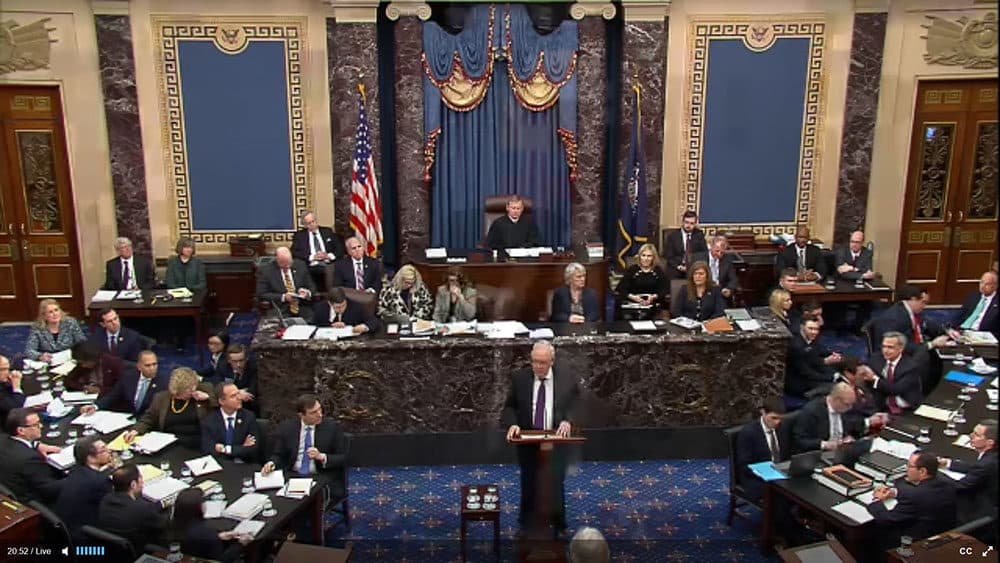Advertisement
National Security In The 'Age Of Impeachment'
Resume
National security and the impeachment trial of President Trump. The president’s defense team says calling witnesses could compromise national security. House managers say it’s the president who’s the threat.
Guests
Barbara McQuade, former U.S. Attorney for the Eastern District of Michigan. Legal analyst for NBC News and MSNBC. Professor at the University of Michigan Law School. (@BarbMcQuade)
Susan Hennessey, senior fellow at the Brookings Institution. Executive editor of Lawfare. (@Susan_Hennessey)
Interview Highlights
On national security and impeachment
Barbara McQuade: “I don't know that we have focused enough on [national security]. I think if I have one complaint about the presentations by both the House managers and the defense is that their opening arguments have been far too long. I think that you risk distracting the fact finder — the Senate — in the public that they serve the more you talk, because then there are a lot of things that people can point to and say, you know, ‘This is all about Joe Biden. This is all about Hunter Biden.’ And I think in a more succinct presentation, there would be the focus and emphasis on national security.
"But as Susan says, that is the thing that likely convinced those who were reluctant to wade into impeachment initially with regard to the Mueller investigation, to convince them that this was worthy of impeachment. Because just as prosecutors use discretion and don't charge a defendant every time a crime is committed — you don't charge every case of jaywalking or littering. You use your resources — and since they're scarce — you use them judiciously. And removal from office is an extraordinary remedy that should come into play only for very egregious misconduct. And here, that national security betrayal is what makes it worthy of removal from office. And I do think that the more you talk about other things and other factors, the more that message can get diluted.”
Trump’s defense team has argued that it’s “absurd” to say a phone call to a foreign leader is a threat to national security. What’s your response?
Susan Hennessey: “I am not sure that the president's attorneys, we can even credit them with truly believing the argument that they're making. Because, of course, nobody here is suggesting that the president of the United States wasn't allowed to have a conversation with a foreign leader. No one was suggesting that he didn't have the limited power to freeze foreign aid in a number of circumstances. The issue here is why he did it, and the motivations. And whether or not he was being motivated in the national interest or not. And so, for example, prior presidents have held up aid. They do so after and with the consent of Congress. They informed Congress about what they’re doing and why. They openly take that position, and recognized a co-equal branches role in defining U.S. national security policy.
"… So the core of the allegation here is not that the president froze military aid, it's that the president froze military aid in order to extort a foreign leader into becoming an opposition researcher for his upcoming political campaign. That the president of the United States used the foreign policy powers of his office to request a foreign country undertake an investigation of a U.S. citizen, absent a valid criminal predicate. These really go to the very heart of how we think about potential abuses of office. And so the idea that this would be absurd on its face, I think that really just doesn't pass the smell test. This is what impeachment was designed for. And frankly, I don't think it's an exaggeration to say these allegations are among the most serious presidential misconduct that has ever been alleged in the history of the American presidency. And it's foolish to minimize that.”
Are we at a point where it’s not impossible to imagine a future where U.S. national security policy is driven by anything other than what’s in the best interest of the U.S.?
Barbara McQuade: “That's a terrifying proposition, because we elect a president to be the commander in chief of our armed forces, to lead the executive branch of our government — for the very purpose of doing what's in the best interest of the United States. To take care that the laws be faithfully executed. If there is one public channel of diplomacy that's being used by our State Department officials, and then some irregular channel that’s being used done by lawyers that the president hires privately to benefit his own personal political interests or some other agenda, then, as Adam Schiff said, all is lost. We are all in this together.
"We're a government of, by and for the people. We rely on democracy and transparency to understand what it is that we're doing collectively as a country. The president is there to serve the people. He is not there to serve himself. And so this is the kind of testimony, I think, that is so important to highlight in contrast to the single call that Trump's defense team wants to focus on, because this is the harm. This is the harm to our national security. When our diplomats, State Department, Defense Department is working on one agenda that is publicly shared, and the president is working on a different, secret, private agenda, that is when there is an abuse of office that is impeachable and removable.”
On the symbolism of impeachment
Susan Hennessey: “The system that we're seeing play out right now is the system of Congress setting bounds. And so there's a lot of focus on whether or not the president is ultimately going to be convicted or acquitted. But I think people should keep in mind that in the history of the United States, a quote-on-quote ‘failed impeachment’ is the history of impeachment — impeachment without removal — and that prior impeachments have served to set really important boundaries around executive power by having Congress make this very, very strong statement: ‘This is unacceptable conduct. This is impeachable conduct.’ That's not just a message to this president, it's also a message to future presidents.”
From The Reading List
Foreign Policy: "Ukraine's Tragic Disappearance in the Fog of Impeachment" — "Last week, U.S. Secretary of State Mike Pompeo reportedly posed a rhetorical question to an NPR reporter: 'Do you think Americans care about Ukraine?' By scheduling his own visit to Ukraine on Friday, Jan. 31, Pompeo is demonstrating that they should. Indeed, his visit is a timely reminder that this vast European country’s success in overcoming Russian aggression and reforming a corrupt politico-economic system is far more important to the United States than merely serving as a backdrop for U.S. domestic political battles.
"Ukraine is a nation of more than 40 million people, the largest country geographically that is fully within Europe, a potential agricultural and economic powerhouse, a barometer of the possibilities for success among other former Soviet states, and a country whose people share American values of freedom, democracy, human rights, and rule of law and who seek security in an existentially difficult environment. Ukraine’s success—as a reforming democracy, a future member of trans-Atlantic institutions, and a bulwark against Russian aggression—is therefore of immense national security importance to the United States. If the United States can stop and reverse Russian aggression in Ukraine, it can prevent it elsewhere—including against existing NATO allies, which the United States is obliged to protect.
"If Ukraine, the cradle of Slavic civilization predating Moscow, succeeds as a freedom-loving, prosperous, and secure democracy, it gives the world enormous hope that Russia itself can one day change. Just imagine if one day—instead of spending massive resources to defend itself and its allies against a belligerent Russia—the West can work together with a Russia that is focused on providing a better life for the Russian people. Imagine if Russia were to overcome its current plague of authoritarianism, corruption, aggression toward neighbors, subversion of NATO allies, and opportunistic support for disruptive forces and regimes globally. Amid these threats and opportunities, Ukraine is key."
Just Security: "A National Security Impeachment" — "The Articles of Impeachment voted by the House narrowly claim abuse of power and obstruction of Congress. At this writing, Senate Majority Leader Mitch McConnell has committed to hold an impeachment trial. Less clear is whether or how Trump plans to defend. What makes prediction hazardous is that two radically different impeachment processes are unfolding. The Democrats claim that President Trump welcomed foreign interference in the tight 2016 election and, after Special Counsel Robert Mueller declined to charge criminal misconduct, brazenly sought foreign interference to denigrate his 2020 electoral rival.
"When Congress investigated, he stonewalled subpoenas until they became irrelevant. Yet Trump’s base largely embraces the Republican counternarrative: that he is blameless, persecuted, and prevailed in the 2016 presidential election despite the interference of Democrats and corrupt Ukrainians. Each side gambles that its narrative will gain steam, forcing the other side to weaken politically. What this standoff also reveals is a deeper threat to our constitutional system, and a pathway forward for legislators to guard against abuses by this and future presidents.
"... Strangely lost in the impeachment drama has been the Articles’ core message: that 'President Trump used the powers of the Presidency in a manner that [1] compromised the national security of the United States and [2] undermined the integrity of the United States democratic process.' Trump is being impeached not just because he is a bad president, but because he is a glaring national security threat, who has sought to normalize both election insecurity and an extreme form of executive unilateralism."
Time: "House Democrats Try to Convince Senate Republicans Trump Compromised National Security — To No Avail" — "'I have news for everybody,' Mick Mulvaney told the world on Oct. 17, weeks after House Democrats launched a formal impeachment inquiry into President Donald Trump. 'Get over it. There is going to be political influence in foreign policy.' In pressuring Ukraine to investigate his political rival last July, Mulvaney argued, Trump was doing nothing his predecessors hadn’t.
"Democrats strongly disagree, and have based their impeachment case on the idea that Trump’s Ukraine gambit was an offense grave enough to warrant impeachment. Exactly when a foreign policy 'quid pro quo' is politics as usual and when it warrants removal from office was the question at the heart of Democrats’ arguments on Thursday as Trump’s Senate trial continued.
"Democrats have never claimed that Trump is the only President to use the power of his office for reelection. The taxpayer-funded Air Force One has been used for political purposes by both his Republican and Democratic predecessors — and not without controversy. But the Democratic impeachment managers hammered home on Thursday the argument that Trump’s conduct with Ukraine was different because he put his own political interests ahead of national security, compromising the latter for the former."
This program aired on January 29, 2020.

